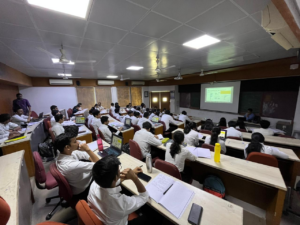The Department of Electronics and Communication Engineering organized Collaborative Teaching for 2ECDE60-Embedded Systems & 3EC3209-Embedded Operating Systems Courses. It was on ‘Real-Time Operating Systems (RTOS)‘ for the students of the B. Tech: Semester-VI (EC) and the students of M.Tech Semester-II (EC, ES). Total seven sessions were conducted by the industry expert (Mr. Manoj Parmar, Program Director – AIShield at Robert Bosch Engineering and Business Solutions Private Limited (RBEI), Bangalore) from Feb to March 2023. The detailed schedule of these sessions is as follows:
| Session No. | Date | Day | Time |
| 1. | 27/02/2023 | Monday | 02:00 – 02:55 pm |
| 2. | 02/03/2023 | Thursday | 02:00 – 02:55 pm |
| 3. | 06/03/2023 | Monday | 02:00 – 02:55 pm |
| 4. | 10/03/2023 | Friday | 08:45 – 09:40 am |
| 5. | 13/03/2023 | Monday | 02:00 – 02:55 pm |
| 6. | 16/03/2023 | Thursday | 02:00 – 02:55 pm |
| 7. | 17/03/2023 | Friday | 08:45 – 09:40 am |
In the first session, Mr. Manoj Parmar discussed the need for Embedded Systems for industrial growth as well as in the day-to-day life in detail along with his company details. He discussed the concept of an operating system and demonstrated several examples to emphasize the need for RTOS in the Embedded System to solve many critical issues. He shared his experience with the students and encouraged them to raise the query on the digital platform named ‘Slack channel.’ In this session, he also shared reading material and video lecture links to his upcoming sessions.
During the second session, the concept of Kernel and its services was the main topic of discussion. Mr. Manoj Parmar utilized live examples to explain the different types of Kernels and their services. The session also covered the differences between General-Purpose Operating Systems (GPOS) and RTOS. The discussion concluded with an exploration of the various applications of RTOS and different types of real-time systems. Additionally, Mr. Manoj Parmar shared his experience working in the field of RTOS.
During the third session’s initial phase, the real-time Kernel and its services were the topic of discussion. Following that, he delved into the intricacies of tasks, processes, and threads, providing relevant examples for each concept. The session’s discussion also included an extensive exploration of process structures, their states, and state transitions. Additionally, he talked about multithreading and thread standards. Towards the session’s conclusion, various applications utilizing these concepts were presented.
The fourth session was utilized to solve doubts related to topics covered till session three. Students actively participated in the discussion and Mr. Manoj Parmar addressed all queries related to using the Kernel, multi-processor system, multitasking, parallel tasking, etc. Mr. Manoj Parmar addressed all queries raised by students.
The concept of multitasking and multiprocessing was discussed in his fifth session. After discussing types of multitasking, Mr. Parmar discussed different scheduling policies. He discussed the required factors to be considered while selecting a particular scheduling policy for any application. He elaborated on different scheduling algorithms like non-preemptive scheduling (FCFS, LCFS, SJF, PBS) and preemptive scheduling (SJF, RR, PBS) with numerical examples in this session. The examples were mapped with real-life applications.
Mr. Parmar discussed the task communication mechanism in his sixth session. He discussed about the types of task communication mechanisms like shared memory, message passing, and remote procedure calls. He has also discussed the issues that are arising in task synchronizations like racing, deadlock, read-write dependency, etc. The Task synchronization techniques like spin lock and mutual exclusion were discussed. He elaborated on this topic with suitable examples for how to choose right RTOS.
In his seventh session, he has discussed domain-specific RTOS. He has also discussed the future and challenges in RTOS. He has enlightened the future of RTOS as a market and industry point of view. Finally, questions-answers and case study assignments related to RTOS were also discussed in the concluding session. The session also included to solve doubts related to the fundamentals of RTOS and kernel-related services. Students actively participated in the session and various queries related to the use of RTOS, Selection of RTOS, RTOS programming were responded by Mr. Manoj Parmar. Towards the end of this session, he shared about the opportunity available with Robert Bosch in the field of Embedded systems at present. He also shared various other areas in which EC students can contribute to Robert Bosch, Bangalore.
This collaborative series of teaching-learning session ended with a vote of thanks.
